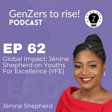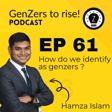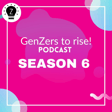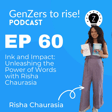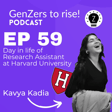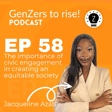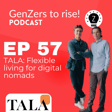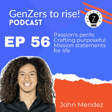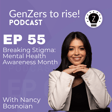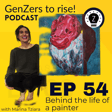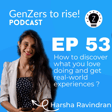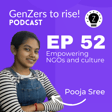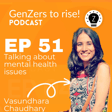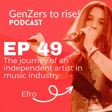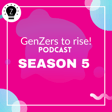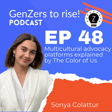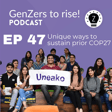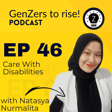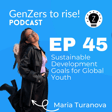Introduction to Changemaker-Z
00:00:01
Speaker
Hello everyone, I'm Kennedy. And I'm Vassilis. We run Changemaker-Z, a student-run initiative that aims to empower, educate, and connect Gen Zers interested in entrepreneurship. We interview teenagers with impactful projects and create resources to help you change the world. If they can't do it, so can you.
00:00:23
Speaker
On this podcast, we discuss the logistics of creating different types of projects with Gen Zers who have already done it. We will leave our social media and website information in the description.
Credit Scores and Extra Credit Sponsorship
00:00:42
Speaker
I want to share something really interesting. Have you ever heard the term credit score? A credit score is a number based on the statistical analysis of a person's credit files. That in theory represents the credit worthiness of that person. There are different methods of calculating credit scores. The most widely used type of credit score is the FICO scores. Did you know that there are 28 different FICO scores? Imagine that.
00:01:04
Speaker
If you are wanting to buy a car, you might check your credit score on a free app. You walk into a dealership thinking, you know, you got a pretty good score, feeling confident until the dealership pulls your credit and it's drastically different than your free score. The solution? Extra credit by credit.com, the sponsor of this episode. With extra credit, you can access the 28 different FICO scores so you can see what the lenders see.
00:01:29
Speaker
What if you want to build a credit industry in order to recall later? Well, Extra Credit can help you with that by reporting your rent and utilities to the credit bureaus. In addition to that, Extra Credit offers features to guard your identity, $1 million ID insurance, dark web scan and data breach alerts, as well as cash rewards for personalized offers.
00:01:50
Speaker
To sign up for extra credit, go to credit.com slash Gen Zers and get started there. To sweeten the deal, you can even get the first seven days absolutely free. It is just $24.99 plus tax a month after the free trial and you can cancel any time. So go check out extra credit today and start working on your credit goals.
Livia Iacobelli and SHRP
00:02:22
Speaker
everyone to another episode of the Dancers to Rise broadcast. With us at the studio is Livia Iacobelli, a rising senior at Hitec High North Town Tree, and the founder of Student Healthcare Witness Program, or SHHRP. SHHRP is a non-profit organization that provides services to support low-income high school students passionate about going into a career in healthcare. This episode is all about SHHRP's actions. Welcome to the show, Livia. Nice to meet you.
00:02:51
Speaker
Hi, nice to meet you too. I'm so excited to be here. So excited as well. Tell us what inspired you to start the Student Healthcare Program.
Inspiration Behind SHRP
00:03:00
Speaker
So what originally inspired me was first of all during COVID I was kind of like you know as many of us locked in our room for many months and so I felt that I wanted to make great use of the time that I had and I kind of started to pull from different facets of my life that I thought were important to me. So I've always been passionate about health care, my
00:03:22
Speaker
family, they grew up poor in different countries outside of the United States. And even one of my siblings, he didn't have the best upbringing when it came to his education and the resources he had. So a lot of these elements kind of combined together to inspire me to pursue this. Originally, it looked completely different. It was a lot more broad. It was a lot less specific. But once I started realizing that this is something that I actually wanted to pursue,
00:03:51
Speaker
I decided to really sit down and think about what I wanted to do, the impact I wanted to make, and the program that I wanted to create. And so that's kind of what led me over the years to kind of refine this program and our goals and things like that.
Challenges and Progress at SHRP
00:04:11
Speaker
And so it kind of took a while during 2020 and 2021 to really get started just because it was just kind of me.
00:04:18
Speaker
But in the beginning of 2022, I kind of was like, you know, I can't like do this by myself. I need to, you know, be willing to reach out to people to help me because, you know, no matter what, I'm going to need a group of people that will support this cause and things like that to help me pursue it.
00:04:36
Speaker
the farthest it can. And so really, at the beginning of 2022, we kind of launched with new people. And ever since then, we've been progressing pretty steadily and pretty consistently. So I'm excited to see where things go. We send you all the best. I agree with you 100%. You always need some people to keep you like your backup. We can do this without having some people that we can trust.
00:05:03
Speaker
This is so amazing in general, like an idea that you've started back in 2020 and now we are in 2022 and you are progressing to your goal.
SHRP's Medical Mentors Program
00:05:14
Speaker
Your mantra is bridging the gap between youth's economic status and the pursuit of a career in healthcare. Which is the process of helping these students? What do you do?
00:05:26
Speaker
So basically, we have a main program right now, which is the medical mentors program. So that's like a sub program organization. And basically, the way we're targeting, you know, our kind of little saying
00:05:39
Speaker
through that program is by, we invited a bunch of low-income youth within California, not specifically, but all of them are just from California, that are interested in healthcare, be part of this program where we educate them about all the paths they can take, the different ways they can navigate this kind of career and educational path financially. So we're educating them about scholarships,
00:06:05
Speaker
The different types of opportunities UCs have to offer, so University California schools, and the amount of opportunities they have to offer to students that are low income. And we're also trying to give them the tools to find internships and experience now, which tends to be really expensive. I don't know, like, you know, a lot of the time we'll look for internships online, but the programs that exist are thousands of dollars, or sometimes they offer scholarships, but not everyone gets them.
00:06:34
Speaker
and so it's kind of a push and pull with those kinds of things and so that's why you know I've always tried to get my you know experiences for free because it's just the easier way and it's more realistic and so we're teaching them about how to get internships how to write a resume so not only are we educating them about pursuing a career in healthcare but we're trying to give them all the professional skills and things of that nature so that
00:06:59
Speaker
when they go out into the world that they can get these skills for free and based on their circumstances and so that's kind of how we're trying to bridge that gap with you know a lot of students that might have these opportunities that you know have classes that educate them and resources that educate them and even parents that are in you know higher level educational medicine and we're trying to kind of
00:07:25
Speaker
override that and support them with things that they might not be aware of that these other supported kids might be already getting. I see. So
Mentorship Structure and Non-Profit Focus
00:07:36
Speaker
how many mentors are in your team right now?
00:07:39
Speaker
So I think it's about five or six. So basically, we have mentors and we have mentees. So the mentors are the pre-med college students. And then when it comes to the mentees, which are the high school students, we have officially 22.
00:07:59
Speaker
And so we're kind of, we, they're on and off, you know, kids, so they're always coming in, leaving, whatever. But either way, we have officially 22 that we ended up allowing into the program. But we are, we did reopen the program so that we can invite more students since we have the infrastructure to support them. That's great. Do you change mentors every single year or like,
00:08:28
Speaker
Because on your website for the pre-med, I saw that maybe you could be you, the next mentor. So if this is a positive, how do you discover new people for your mentor's positions?
00:08:43
Speaker
Yeah, that's a good question. So that is a really long process. That was something that took a lot of emails, a lot of scouring the internet for different clubs. So basically when it came to finding mentors, that was like the first thing we did.
00:08:59
Speaker
I went to every college in my area, went for all the clubs they have, emailed all the club presidents, vice presidents with all of our information and just really hope for the best. And so I probably reached out to like a hundred different clubs across like
00:09:16
Speaker
art my area that were like pre-med health clubs and they ended up you know giving information to their club members and they ended up applying and so that was kind of the the process but even though that's in a nutshell that took a long time and a lot of like time and effort and so but in terms of like being a mentor next year I would love to I've kind of already taken on that role a little bit when like
00:09:41
Speaker
someone isn't able to come like a mentor, like I'll step in and like I'll support and I'll like help them with whatever topic we're covering and so you know I've grown close with students that are like my age or you're younger than me and it's weird because like we're all we could be in like the same class but you know it's kind of this difference now that I'm like helping guide them
00:10:03
Speaker
based on all this experience and all this information that I've been lucky to learn over the years. And so I've kind of taken on that role, but I look forward to being able to do it officially as a pre-med student in college. That's great. You are a non-profit organization. What does this mean for your actions?
00:10:26
Speaker
Yeah, so basically we're working on getting funds raised. However, when we do get that process going, all of the money that we collect will go back into the students. So this is not something for us to pay ourselves or anything like that.
00:10:41
Speaker
But everything since we are supporting low-income youth, we want to be able to support them in whatever needs they might need. So may that be through educational, so backpack, you know, books, things like that, and also just helping them pursue their extracurriculars. Like when we gave them the application, we were like, are there any extracurriculars that you need financial support in? And so hopefully when we are able to get pensions, we want to be able to like help them with that.
00:11:09
Speaker
Like if someone's playing soccer and they need new cleats or something like that, being able to help them in that specific facet of their life because maybe their family can't pay for it. So basically just really trying to help them with the donations that we receive or their specific needs and other broader educational needs. That's good to know. That's another question that I have.
Educational Resources and Support
00:11:34
Speaker
The books, they are books that they are focused on.
00:11:39
Speaker
Be prepared to pass the SAT exams or you're talking about the books that you need to learn that you are operating on in med school. When I say books, I'm more so referring to like notebooks, like things that they might need for school, but eventually we've been to have been like an SAT prep course because those are really expensive. So eventually we would want to put some money into supporting that sub-program so that a lot of these students can get the support that, you know,
00:12:09
Speaker
might be worth, you know, thousands of dollars elsewhere for free. What if I want to subscribe to one of your programs? How can someone do that? Yeah, so basically we originally had our first round of applications at the beginning of the summer, so that was approximately June.
00:12:28
Speaker
But basically because of what I mentioned earlier about us having the infrastructure to support more students, we are reopening our application so it is friendly open at this moment. It will close September 3rd and the launch date of the actual program is September 10th.
00:12:46
Speaker
You know, by the time this airs, it might already have closed. However, that's kind of our plan to support more students. And so it's kind of a year-long program. But because we want to support more youth, we're reopening it so that we can get more youth involved.
00:13:04
Speaker
Um, and so that's kind of the way we've been going about it for like a Google form and they, you know, fill in their information, making sure that they fit the criteria of the program. And then that they, um, are actually interested in healthcare and learning about that through supplemental questions. Yeah. And we can get informed while the program is open again for people to subscribe via your social media handles. That is correct.
00:13:30
Speaker
Yeah so we have our Instagram shrp program so it's like shr and then program but either way that's kind of our Instagram and then our website is sharp shrp.info
00:13:45
Speaker
and basically those have all the information regarding how the application is open and the different elements that we will support students with as well as the application information but if you have the Instagram you can find our website because it's in the link in our bio or if you have our website you can find you know the information there or our Instagram on our website too.
00:14:07
Speaker
You listen to that guys, go and check out the description below for all the details about social media handles and the website so that you can be involved whenever the program is open again. Now, SHRP is already 2 years old and you have invested a lot of time and energy on that. Which are SHRP's plans for the future?
Future Initiatives for SHRP
00:14:30
Speaker
Yeah, so basically...
00:14:33
Speaker
Since we kind of really got started going, really got going, sorry, this year, our goal is to start opening ways to donate. And so next would be kind of opening that donation element of our program and being able to put that money back into our youth and our programs themselves.
00:14:53
Speaker
And then later we also want to open some sort of SAT prep program. May that be within the medical mentors program or just a separate program. But of course that would all be free. And so definitely those two. And then just definitely opening up our staff. We want to have more people support different parts of the program that need support. And so may that be through graphics or newsletters or research.
00:15:19
Speaker
networking or things of that nature. We just really want to expand since we're currently a three-person team. And so hopefully by the end of the year, we'll be reaching more or less those goals and setting more and more ones for the future. We wish you the best. Well done. Whatever you have already a cold list until now. And we can't wait to see you grow in the future. I think that this is the end of the episode. Thank you, Livia, for being with us today.
00:15:49
Speaker
Yeah, thank you for having me. Thank you so much. We talked about the Student Healthcare Readness Program based in San Diego country in California. It resources mission and future.
00:16:01
Speaker
Stay tuned for upcoming episodes with great guests and subjects, no hints this time. You can definitely check the social media handles of XHRP in the description below. And you
Closing and Social Media Invitation
00:16:12
Speaker
can always use the change makers and app available on App Store and Playstore in order to access exclusive content and articles from our friends at threat.com and ZengOz company. But until next time, don't forget to change the world, bye!
00:16:34
Speaker
Thank you guys for listening. We hope you enjoyed the conversation. We had such a great time. Make sure to leave us a review. If you want more Changemakers content, you can follow us on Instagram at ginsears2rise and on Facebook at changemakerseat.

